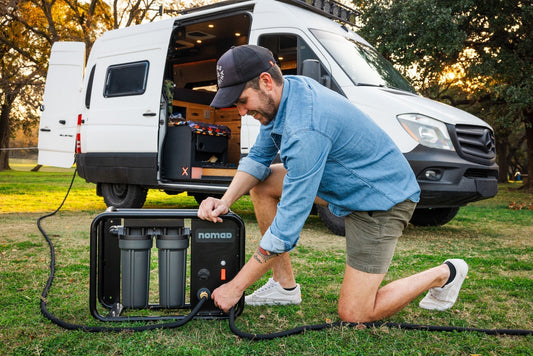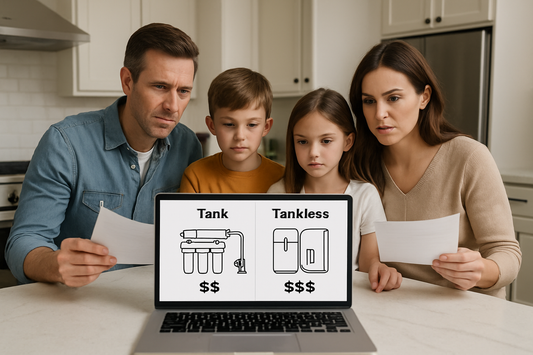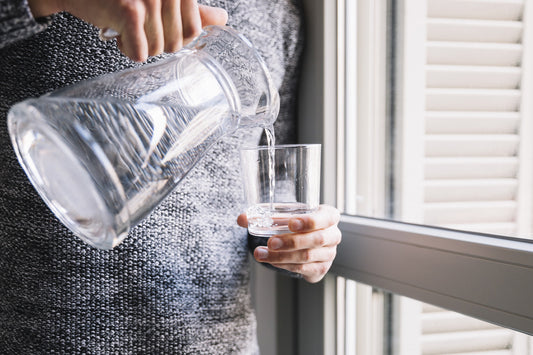Living off the grid doesn't mean compromising on clean water. Whether you're cruising cross-country in an RV, powering down at a remote cabin, or embracing van life full-time, accessing safe drinking water becomes your daily reality check.
The traditional home filtration playbook falls apart fast when you're miles from the nearest municipal water supply. Creek water, well water, and questionable campground taps present unique challenges that require specialized solutions. That's where advanced off-grid water filtration systems step in to bridge the gap between wilderness living and water security.

Why Standard Home Filters Fail Off-Grid
Your trusty under-sink filter was designed for pre-treated municipal water, not the unpredictable cocktail of contaminants found in natural water sources. Remote water often contains:
- Biological contaminants: Bacteria, viruses, and parasites from animal activity
- Sediment overload: Sand, silt, and organic matter that clogs standard filters rapidly
- Chemical runoff: Agricultural pesticides and industrial pollutants in rural waterways
- Mineral extremes: Either too hard or too soft, affecting both taste and equipment longevity
Standard filters simply can't handle this complexity while operating without reliable electricity or water pressure.
Game-Changing Off-Grid Water Filtration Technologies
Solar-Powered Purification Systems
Solar water purification represents the sweet spot between sustainability and effectiveness. These systems harness UV light to eliminate 99.9% of bacteria and viruses while requiring zero grid power.
How it works: Concentrated UV-C light disrupts the DNA of harmful microorganisms, rendering them unable to reproduce. Modern solar purifiers can process 2-5 gallons per hour in direct sunlight.
Best for: RV travelers in sunny climates, desert camping, and emergency backup systems.
Gravity-Fed Filtration Systems
Gravity systems leverage the simplest force in nature to push water through multiple filtration stages. No pumping, no power, no problem.
Multi-stage process: Water flows from an upper reservoir through ceramic filters, activated carbon, and sometimes additional UV sterilization before reaching the clean water container.
Processing capacity: Most gravity systems handle 1-4 gallons per hour depending on filter configuration and water quality.
Ideal applications: Base camps, remote cabins, and extended wilderness stays where consistent water access matters more than speed.
Portable Reverse Osmosis Units
Battery-powered RO systems bring laboratory-grade water purification to the most remote locations. These compact units remove everything from heavy metals to dissolved salts.
Advanced membrane technology: Semi-permeable membranes filter contaminants down to 0.0001 microns while preserving essential minerals through selective filtration.
Power efficiency: Modern units process 10-15 gallons on a single battery charge, with some featuring solar charging capabilities.
Perfect for: Van lifers crossing varied terrain, boaters accessing different water sources, and anyone requiring consistent water quality regardless of source.

Choosing Your Off-Grid Filtration Strategy
For RV and Van Life Enthusiasts
Primary considerations: Weight, space efficiency, and power consumption. Look for systems that integrate with existing 12V setups and don't require permanent installation.
Recommended approach: Combination systems featuring a primary gravity or solar filter with a portable RO backup for questionable sources. [Internal link: Browse our selection of portable water purification systems] designed specifically for mobile living.
For Remote Cabin Owners
Key factors: Seasonal weather variations, local water source consistency, and maintenance accessibility during winter months.
System strategy: Permanent solar installation with battery backup, paired with whole-cabin filtration for year-round reliability. Consider freeze-protection features for winter operation.
For Serious Outdoor Adventurers
Critical needs: Ultralight portability, durability under extreme conditions, and fool-proof operation when fatigue sets in.
Equipment focus: Personal-sized systems that pack small but handle diverse water sources. [Internal link: Explore our outdoor water filter collection] featuring expedition-tested equipment.
Maintenance in Remote Locations
Off-grid filtration success depends on sustainable maintenance routines:
Filter replacement planning: Stock 6-12 months of replacement filters, with spare parts for seals and connections.
Cleaning protocols: Establish weekly backflushing schedules and monthly deep-cleaning procedures using available cleaning agents.
Winter considerations: Implement freeze-protection measures including system drainage, insulation, and antifreeze protocols where appropriate.
Troubleshooting basics: Learn to diagnose common issues like pressure drops, taste changes, and flow restrictions using simple field tests.
The Future of Portable Water Technology
Emerging innovations are making off-grid water independence more accessible than ever. Graphene-based membranes promise longer filter life with better contaminant removal. Improved solar efficiency extends operating hours into cloudy conditions. Smart monitoring systems alert users to filter replacement needs and system performance issues.
These advancements aren't science fiction – they're shipping today from manufacturers focused on the growing remote living market.
Making the Investment Work
Quality off-grid filtration systems represent a significant upfront investment, typically ranging from $300-$1500 depending on capacity and features. However, the alternative – buying bottled water or risking waterborne illness – quickly exceeds these costs.
Calculate your break-even point based on current water purchasing habits. Most serious off-grid enthusiasts recover their investment within the first year through eliminated bottled water costs and avoided medical expenses.

Your Water Independence Starts Here
Reliable water filtration transforms off-grid living from survival mode to comfortable independence. Whether you're planning weekend adventures or permanent remote relocation, the right filtration technology ensures clean water never becomes your limiting factor.
The key lies in matching system capabilities to your specific needs, understanding maintenance requirements, and investing in proven technology rather than experimental gadgets.
FAQ Section
Q: How much power do off-grid water filters actually use?
Solar systems use zero grid power, while battery-powered RO units typically consume 12-24V DC equivalent to running LED lights for a few hours daily.
Q: Can portable filters handle really dirty creek water?
Yes, but pre-filtering through cloth or settling tanks extends filter life significantly. Multi-stage systems handle sediment better than single-filter units.
Q: What's the lifespan of filters in off-grid systems?
Depends on water quality and usage, but expect 500-1500 gallons per filter cartridge. Heavily contaminated sources reduce lifespan by 30-50%.
Q: Do I need different systems for different seasons?
Winter requires freeze-protection features, while summer may need higher capacity. Year-round systems should include temperature management and seasonal maintenance protocols.





